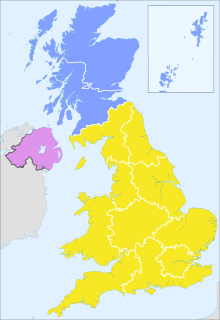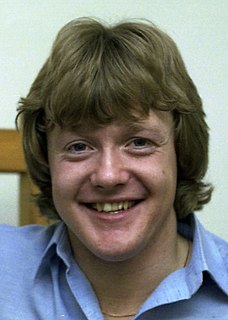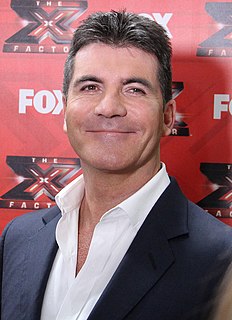
Who Wants to Be a Millionaire? is an international television game show franchise of British origin, created by David Briggs, Mike Whitehill and Steven Knight. In its format, currently owned and licensed by Sony Pictures Television, contestants tackle a series of multiple-choice questions to win large cash prizes, with the format being a twist on the game show genre – only one contestant plays at a time, similar to radio quizzes; contestants are given the question before attempting an answer, and have no time limit to answer questions; and the amount offered increases as they tackle questions that become increasingly difficult. The maximum cash prize offered in most versions of the format is one million of the local currency.

Press Your Luck is an American television daytime game show created by Bill Carruthers and Jan McCormack. It premiered on CBS on September 19, 1983, and ended on September 26, 1986. In the show, contestants collected spins by answering trivia questions and then used the spins on an 18-space game board to win cash and prizes. The contestant who amassed the highest total in cash and prizes kept his/her winnings for the day and became the champion. Peter Tomarken was the show's host, and Rod Roddy was the primary announcer. John Harlan and Charlie O'Donnell filled in as substitute announcers for Roddy on different occasions. Press Your Luck was videotaped before a studio audience at CBS Television City, Studios 33 and 43, in Hollywood, California. The show was a retooling of the earlier Carruthers production Second Chance, which was hosted by Jim Peck and aired on ABC in 1977.

Blankety Blank was a British comedy game show which ran from 18 January 1979 to 12 March 1990 on BBC One, hosted first by Terry Wogan from 1979 until 1983, then by Les Dawson from 1984 until 1990. Regular members of the celebrity panel included Kenny Everett, Lorraine Chase, Gareth Hunt, Gary Davies, Paul Daniels and Cheryl Baker.

Greed is an American television game show that was first broadcast on Fox in November 4, 1999 and last broadcast on July 14, 2000 with the total of 44 episodes in one season. Chuck Woolery was the show's host, with Mark Thompson serving as a primary announcer. The game consisted of a team of contestants who answered a series of multiple-choice questions for a potential prize of up to $2 million. The program's catchline is "The Richest Most Dangerous Game In America".
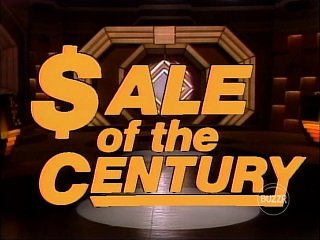
Sale of the Century is an American television game show that debuted in the United States on September 29, 1969, on NBC daytime. It was one of three NBC game shows to premiere on that date, the other two being the short-lived Letters to Laugh-In and Name Droppers. The series aired until July 13, 1973, and a weekly syndicated series began that fall and ran for one season. Actor Jack Kelly hosted the series from 1969 to 1971, then decided to return to acting full-time. He was replaced by Joe Garagiola, who hosted the remainder of the daytime series plus the one season in syndication.
The Joker's Wild is an American television game show that has aired at different times since the 1970s. Contestants answer questions based on categories determined randomly by a mechanism resembling a slot machine. The show's title refers to the game's slot-machine mechanism also having jokers.

Celebrity Squares is a British comedy game show based on the American comedy game show Hollywood Squares. It first ran from 20 July 1975 to 7 July 1979 and was hosted by Bob Monkhouse, then from 8 January 1993 to 3 January 1997 and was also hosted by Monkhouse.

Debt was an American game show hosted by Wink Martindale which aired on Lifetime from June 3, 1996 to August 14, 1998. The show featured contestants who were trying to earn money to get out of debt.

History IQ is a game show on the History Channel which premiered on October 2, 2000 and aired for two seasons. Marc Summers hosted and Harvey announced, reuniting the two from the Nickelodeon game show Double Dare. History IQ was produced by Glow in the Dark Productions.

Miljoenenjacht, officially Postcode Loterij Miljoenenjacht, is a Dutch game show, sponsored by the country's postcode lottery, where a contestant and at-home viewer could win up to €5,000,000 or as little as €0.01. The show is broadcast at various times, spanning across six episodes for each set. The program was originally shown by TROS on NPO 2, but moved to creator John de Mol's channel Tien in 2005. After the channel was discontinued after its sale to the RTL Group, the program moved to RTL 4.

Temptation was an Australian game show which premiered on the Nine Network on 30 May 2005. Hosted by Ed Phillips and Livinia Nixon, the show was a remake of Sale of the Century, which aired on Nine in the same timeslot for more than twenty years between 1980 and 2001. Temptation had the same general format of its predecessor, but with several new features and a de-emphasis on the "shopping" aspects of the endgame. The show ran until 30 November 2007, when it was placed on hiatus by the network following strong competition from game show Deal or No Deal on the rival Seven Network; during the hiatus, Nine filled the timeslot with episodes of the American sitcom Two and a Half Men. When Ed Phillips made an appearance on The NRL Footy Show he announced "maybe summer" would be the return of the show. This statement was accurate, as Temptation returned for a shortened fourth series from 1 December 2008 with unaired episodes which were recorded during 2008. During that time, Ed Phillips was dumped by the Nine Network after his contract expired in November, and Temptation never returned to the schedule. After 23 January 2009, when the show's final episode aired, all Temptation websites were removed, and Two and a Half Men returned to Channel Nine's 7:00pm schedule.
The Price is Right is a British game show based on the US version of the same name. It originally aired on ITV from 24 March 1984 to 8 April 1988 and was hosted by Leslie Crowther. The show later briefly moved to Sky One for one series as The New Price is Right from 4 September 1989 to 31 August 1990 with Bob Warman as the host.
Quicksilver is an American game show that saw contestants answering trivia questions that more often than not resulted in responses that were unintentional puns. The show aired on USA Network from July 27, 1994 to December 23, 1994, with reruns continuing until October 13, 1995 and was produced by Stone Stanley Entertainment. Ron Maestri hosted.
Raise the Roof was a British television game show which ran from 2 September 1995 to 13 January 1996 for ITV and hosted by Bob Holness.
$ale of the Century is an Australian game show that aired on the Nine Network from 14 July 1980 to 29 November 2001. Tony Barber hosted a game show with essentially the same format under the title The $25,000 Great Temptation from 1970-76, and was also the initial host of Sale for over a decade before being replaced by Glenn Ridge in 1991.

Wheel of Fortune was a British television game show based on the American show of the same name created by Merv Griffin. Contestants compete to solve word puzzles, similar to those used in Hangman, to win cash and prizes. The title refers to the show's giant carnival wheel that contestants spin throughout the course of the game to determine their cash and/or prizes. The programme aired between 19 July 1988 and 21 December 2001 and was produced by Scottish Television (STV) for the ITV network - having effectively replaced Now You See It as STV's prime time game show offering for the ITV network. It mostly follows the same general format from the original version of the programme from the United States, with a few minor differences.
Temptation: The New Sale of the Century is an American syndicated television game show loosely based on both the original Australian and American Sale of the Century versions, plus the 2005 Australian version, also titled Temptation. The show began airing in syndication on September 10, 2007, with the last first-run episode airing on May 23, 2008. Reruns continued until September 5, 2008.

Whammy! Push Your Luck is a Philippine television game show broadcast by GMA Network. Based on the American game show Press Your Luck and its updated version Whammy! The All-New Press Your Luck. Hosted by Paolo Bediones and Rufa Mae Quinto, it premiered on October 8, 2007. The show concluded on February 29, 2008 with a total of 105 episodes.
Now You See It was a Scottish television game show that aired mostly in Scotland throughout its run. It was shown to a lesser degree across some of the ITV Network. It was based upon the U.S. version of the show and used the US show's "halftime cue" as its theme music.
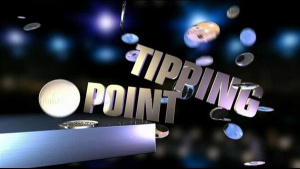
Tipping Point is a British television game show which began airing on ITV on 2 July 2012, and is presented by Ben Shephard. Four contestants answer general knowledge questions to win counters which they use on a large coin pusher arcade-style machine. Only the winner at the end has a chance to take home any money; the others leave with nothing except any non-cash prizes they may have won during the game.
